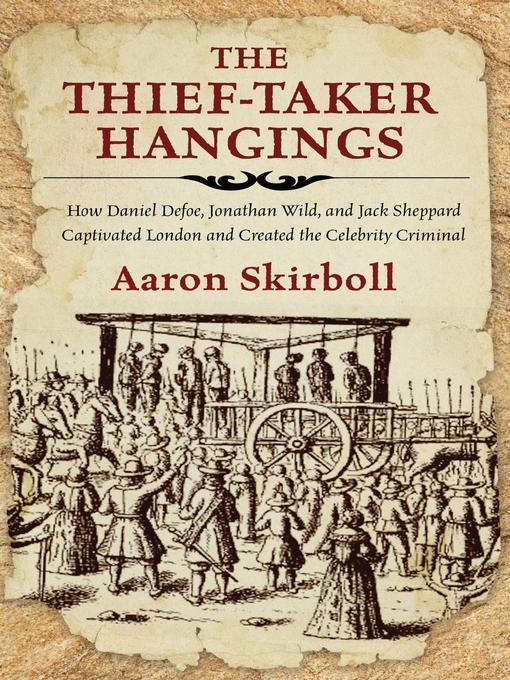
The Thief-Taker Hangings
How Daniel Defoe, Jonathan Wild, and Jack Sheppard Captivated London and Created the Celebrity Criminal
- اطلاعات
- نقد و بررسی
- دیدگاه کاربران
نقد و بررسی

Starred review from July 14, 2014
Skirboll (The Pittsburgh Cocaine Seven) masterfully weaves the captivating stories of three Englishmen and how one’s newspaper coverage of the other two “birthed a genre.” Most readers will recognize Daniel Defoe as the author of Robinson Crusoe, but he also started one of the first newspapers in England and was deemed the father of literary journalism. Skirboll details Defoe’s early life, including how he ended up in prison and how that influenced his writing of Moll Flanders and gave him credibility as an interviewer. As the targets of Defoe’s journalistic endeavors, the burglar Jack Sheppard caught the romantic attention of the public during a manhunt for him, while Jonathan Wild, the veritable inventor of organized crime, fell from having the underworld of London (and sometimes the establishment) in the palm of his hand to swinging from the gallows. In the course of his storytelling, Skirboll also covers the early history of publishing, runs through the grisly details of the English justice system of the early 18th century, and details how brutish life could be for the average person of the time. A rollicking romp through London’s underbelly, Skirboll’s rich, multilayered account reveals the birth of society’s fascination with criminals.

July 15, 2014
How the beginnings of true crime reporting and the birth of tabloid journalism can be tagged to Daniel Defoe's years in prison for libelous sedition.Generally eschewing troublesome political writing after his imprisonment, Defoe instead investigated and wrote about the lower orders, providing Skirboll (The Pittsburgh Cocaine Seven: How a Ragtag Group of Fans Took the Fall for Major League Baseball, 2010) with wonderful resources for this story of criminal Jonathan Wild (1682-1725) and escape artist Jack Sheppard (1702-1724). Wild learned the fine art of thievery while serving in debtors prison, and he learned it so well that he became the man thieves turned to for advice. It wasn't long before Wild incorporated and set up his "Lost Property Office" advertising and selling stolen items back to their owners. Thieves who didn't bring their goods to him, like Sheppard, were "apprehended" and often hanged, with Wild taking the reward; thus his title of "Thief-Taker." Eventually, he broke up London's largest gangs and had hundreds of thieves on his own list. Skirboll shows the lives and trials of Londoners from all classes. In the 18th century, the city had no official police department, and it was up to the victim to initiate the prosecution of wrongdoers. Defendants often received no counsel, and they also had to worry about the straw men, professional perjurers and unpunished crime. Though this is not a Defoe biography, his background and career producing pamphlets and newspapers are vital. "His writing propelled journalism into the future and gave us," writes the author, "the celebrity criminal, the gossip column, investigative reporting, tabloid journalism, and the true crime drama." His exclusive interviews of felons in Newgate and other London prisons truly changed the face of journalism.The daring cleverness of both Wild and Sheppard makes for fun historical reading.
COPYRIGHT(2014) Kirkus Reviews, ALL RIGHTS RESERVED.

Starred review from September 1, 2014
Jonathan Wild, a real-life ringleader of thieves in 18th-century London, might make you laugh--not from amusement but rather incredulity at his audacious exploits. His London was a lawless one as he reigned during a time when an organized police force was considered to be an expensive and repressive nuisance. Using his influence to extort, bribe, and occasionally inform on his colleagues, Wild became a successful and powerful force both in the underworld and society circles of the time. Skirboll (The Pittsburgh Cocaine Seven) details numerous Hollywoodesque scrapes, chases, and escapes; further proving that truth is far stranger than fiction. The author evocatively portrays a strange and alien land whose indifferent government legislated hundreds of capital crimes, carried out endless executions, and yet was effectively lawless. Skirboll's research led him to British archives and contemporary newspapers, unearthing a fascinating story. He immerses the reader in the period but wears his learning lightly. VERDICT Fans of both fictional and true crime stories will enjoy this fresh, well-written, and captivating page-turner full of fascinating characters engaged in a fast-moving plot.--Michael O. Eshleman, Kings Mills, OH
Copyright 2014 Library Journal, LLC Used with permission.




دیدگاه کاربران